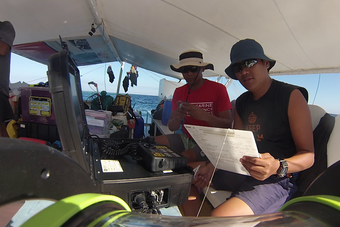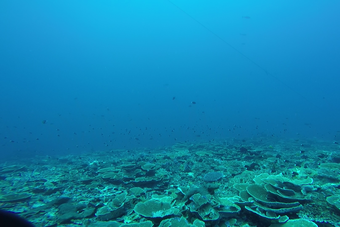Publications:
Quimpo et al. 2018
scientific
article |
Raffles Bull Zool
|
open access

Preliminary observations of macrobenthic invertebrates and megafauna communities in the upper mesophotic coral ecosystems in Apo Reef Natural Park, Philippines
Quimpo TJR, Cabaitan PC, Olavides RDD, Dumalagan EE, Munar J, Siringan FP
The Philippines is located within an area of high reef biodiversity. However, it is vulnerable to the overexploitation of marine resources, which has reduced the abundance of many species, particularly large reef fish and marine turtles in the shallow reef areas (< 30 m). There is a need to assess the populations of these marine animals in the mesophotic coral ecosystems (> 30 m). The objectives of the study were (1) to determine the macrobenthic invertebrates and megafauna communities across the different reef type and depth; (2) compare species composition of macrobenthic invertebrates and megafauna communities across reef type and depth; and (3) to determine the benthic cover across reef type and depth. Macrobenthic invertebrates and megafauna communities in the upper mesophotic zone (30–40 m) in Apo Reef Natural Park, Philippines were sampled using 15 min Underwater Visual Census (UVC). We observed ‘regionally’ rare macroinvertebrates and megafauna such as Holothuria fuscogilva, Thelenota ananas, Bolbometopon muricatum, Cheilinus undulatus, Alopias pelagicus, Triaenodon obesus, and Eretmochelys imbricata, which may be attributed to the long term (21 years) protection provided by Apo Reef. Interestingly, there were no significant differences in species richness, abundance and species composition across reef types and depths, probably because of horizontal and vertical movement of megafauna and the relatively similar benthic composition. This study provides one of first quantification of macrobenthic invertebrate and megafauna communities in mesophotic reefs, which is data deficient in the coral triangle; thus, contributing to the budding mesophotic research program in the region.
7- 40 m
Mesophotic “mentions”
30 x (total of 3389 words)
Classification
* Presents original data
* Focused on 'mesophotic' depth range
* Focused on 'mesophotic coral ecosystem'
Fields
Biodiversity
Community structure
Focusgroups
Fishes
Other invertebrates
Locations
Philippines
Platforms
SCUBA (open-circuit or unspecified)


